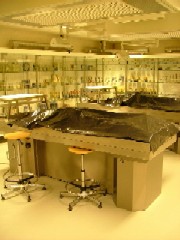Aspirin Trivia
in Medical Trivia No Comments » We all take Aspirin pretty much for granted, but did you know that before Aspirin was available, people used willow bark! They didn’t understand how or why it worked, but chewing on a section of bark did in fact relieve pain. It was even suggested that it should be used during childbirth. Can’t see that helping!
We all take Aspirin pretty much for granted, but did you know that before Aspirin was available, people used willow bark! They didn’t understand how or why it worked, but chewing on a section of bark did in fact relieve pain. It was even suggested that it should be used during childbirth. Can’t see that helping!
I did a little searching and went through some books to see what else I could find out. Actually, the history was quite interesting, but then I found something else¦ a few bizarre uses!
Aspirin as we know it was supposedly created in 1897, but it can be traced back about 3500 years. Hippocrates (the father of technical medicine) discovered recipes that used the bark of the willow tree (mentioned above) to produce a powder that would relieve headaches, pain and fever. This substance would be used for generations.
Read the rest of this entry »
 An autopsy is a procedure performed on a non-living body in order to learn valuable clues as to the cause death. The word ‘autopsy’ comes from the Greek words ‘auto’ and ‘opsis’, meaning ‘to see for oneself’. Who performs autopsies and how? Why does it take so long to receive results, and how is the determination of death made? To understand the answers to these questions, an explanation of the procedure known as an autopsy is helpful.
An autopsy is a procedure performed on a non-living body in order to learn valuable clues as to the cause death. The word ‘autopsy’ comes from the Greek words ‘auto’ and ‘opsis’, meaning ‘to see for oneself’. Who performs autopsies and how? Why does it take so long to receive results, and how is the determination of death made? To understand the answers to these questions, an explanation of the procedure known as an autopsy is helpful. * The stapes, also known as the stirrup bone, located in the middle ear, is the smallest bone in the body. It is .28 centimeters (.11 inches) in length.
* The stapes, also known as the stirrup bone, located in the middle ear, is the smallest bone in the body. It is .28 centimeters (.11 inches) in length. It doesn’t take much research to learn that a diet based on fast foods makes one feel sluggish while eating a healthier diet results in more energy and overall health. Some foods are packed with healthful benefits causing researchers to term them as healing foods. The following facts discuss various foods that help ward away illness and promote a healthier state of being.
It doesn’t take much research to learn that a diet based on fast foods makes one feel sluggish while eating a healthier diet results in more energy and overall health. Some foods are packed with healthful benefits causing researchers to term them as healing foods. The following facts discuss various foods that help ward away illness and promote a healthier state of being. I thought that I knew everything there was to know about coughs. But after a little research, it seems that I had a lot to learn and some of what I found is just plain bizarre!
I thought that I knew everything there was to know about coughs. But after a little research, it seems that I had a lot to learn and some of what I found is just plain bizarre! Some of the earliest evidence of medical instruments comes from Babylon c.1800 B.C. A surgeon’s use of a bronze knife is referenced in Hammurabi’s Code in which it states that if a patient dies due to the surgeon’s use of the knife, the surgeon’s hand “shall be cut off.”
Some of the earliest evidence of medical instruments comes from Babylon c.1800 B.C. A surgeon’s use of a bronze knife is referenced in Hammurabi’s Code in which it states that if a patient dies due to the surgeon’s use of the knife, the surgeon’s hand “shall be cut off.” Everyone dreams. No exception. You may not remember your dreams, but you are having them. And learning to remember them is easier than you might think.
Everyone dreams. No exception. You may not remember your dreams, but you are having them. And learning to remember them is easier than you might think. Most of us know what blood is and a little about what makes up blood. January was blood donor month. Here’s some blood trivia and facts.
Most of us know what blood is and a little about what makes up blood. January was blood donor month. Here’s some blood trivia and facts.